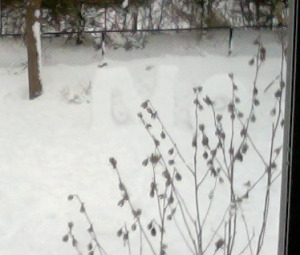She was a retired high school chemistry teacher, a reader of Bonhoeffer, and someone whose later years were filled with enough wisdom and love to pray for the people who would harm and kill others rather than foster and bless them. She spoke and wrote with love and intelligence. For the past eight years, she blessed my life as a companion in study and prayer. Even when she moved hundreds of miles away a few years back, she remained in my heart.
Marge O’Brien was kind enough to share her thoughts with me in many conversations. She was also kind enough to do the same for anyone who read my yearly Advent Devotional. With grateful thanks, I share her words with you:
Psalm 126; Habakkuk 3:13-19; Matthew 21:28-32
Though the fig tree does not blossom and no fruit is on the vines; though the produce of the olive fails and the field yields no food; though the flock is cut off from the fold, and there is no herd in the stalls, yet I will rejoice in the Lord; I will exult in the God of my salvation. God, the Lord, is my strength; he makes my feet like the feet of a deer, and makes me tread upon the heights.
Habakkuk 3:17-19
Habakkuk was a prophet in the late seventh and early sixth centuries BCE. It was a time of great turmoil in Jerusalem and of many great injustices in the world. In many ways like in our own world, the question arises, “Where is God’s justice?” Why do the poor suffer while the powerful go unpunished for their misdeeds? Why do bad things happen to good people? Perhaps we ask the wrong questions. Is it up to us to criticize God? Or is it possible that there is something else going on?
Perhaps we have a role in bringing God’s kingdom into our world. Over and over again, in both the Old and New Testaments, we are reminded that our God wills a world of righteousness and justice, a world with compassion for the poor and the sick, a world of peace and love. Sometimes we are depressed by what we see in the events of our time. We feel helpless to make things better. Habakkuk foresaw great troubles coming to Jerusalem in the form of warring nations. He knew that times were going to be rough. “YET I will rejoice in the God of my salvation!”
There are times in our own lives when we feel helpless. We do not have control over what is happening. Jobs are lost. Relationships fail. Illness consumes us or someone we love. YET, in all of the sadness and violence, God is beside us, loving us, guiding us, helping us. As we look back on some of the dark times in our life, so often we see God at work picking up the pieces for us and helping us get through to a brighter side of the darkness.
And there is the answer: God, Jesus, Holy Spirit, with us always. In the darkness or the light, as Julian of Nowich reminds us “All shall be well.”
“Lord Jesus, let our minds rest in your Word, so that when doubt and grief would overwhelm us, faith will open our eyes to see your hand at work in our life and enable us to turn toward the future with hope and toward each other in perfect charity.” A Prayer from St. Augustine.
Offered on December 13, 2014, by Marge O’Brien, retired teacher now worshipping at St. David’s Episcopal ChurchIn North Chesterfield Virginia, steadfast pray-er, child of God.


